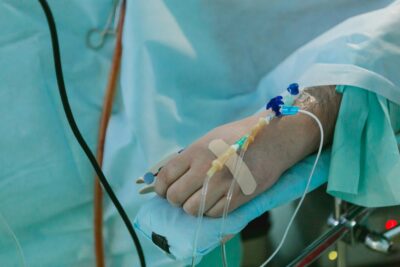Understanding Recovery & At-Home Tips
A common question is, “What exactly is post-surgical care?” The support and medical care a person requires following surgery is simply referred to as post-surgical (or post-operative) care. The kind of procedure carried out, the patient’s age, general health, and medical history all affect this treatment.
Post-operative care can last for days, weeks, or even months and usually begins immediately following surgery, frequently while you’re still in the recovery area. Physical therapy, pain management, wound care, and careful observation for any indications of problems may all be part of it. Whether you’re recovering at home, at an outpatient rehabilitation facility, or in a hospital, we’ll take you through the various phases and kinds of care you may encounter in this guide. Knowing what to prepare for will help you plan for a quicker recovery, prepare your house, and communicate with your doctor.

In-Hospital Post-Surgical care
This is the initial phase of your recovery, which starts while you are still in the hospital after surgery. Following the procedure, you will be transferred from the operating room to a recovery area so that medical professionals can keep a close eye on your status. Throughout this period, the medical staff will routinely examine your: • Body temperature, breathing rate, pulse, blood pressure, and surgical wound (for indications of infection or problems) Additionally, they will keep an eye out for possible issues including bleeding, blood clots, infections, or allergic reactions, all of which can occasionally happen after surgery.
Anesthesia is frequently used during surgery, which may have an impact on your body’s reaction and how soon you wake up. You will stay in the recovery area until you are completely conscious and stable if you were given general anesthesia. Early post-operative care is crucial for spotting and treating any urgent problems and ensuring a safe start to your recovery.

Post-Surgical Care: Inpatient vs. Outpatient Surgeries
How long will you stay in the hospital after surgery? The answer depends largely on the type and complexity of your procedure.
Most surgeries fall into one of two categories: inpatient or outpatient.
- Inpatient surgeries require at least one
overnight stay in the hospital. These are typically more complex procedures that carry a higher risk of complications, involve longer recovery times, and demand more intensive post-operative care. Common examples include:
- Gastric bypass surgery
- Colectomy (removal of part or all of the colon)
- Coronary artery bypass
- Heart valve repair or replacement
- Intestinal endoscopy (in complex cases)
- Outpatient surgeries, also known as same-day surgeries, are usually less invasive and don’t require an overnight hospital stay. After a brief period of observation, most patients can return home the same day. Common outpatient procedures include:
- Cataract surgery
- Lumpectomy (removal of a breast lump)
- Minor muscle, tendon, or joint repairs
Understanding whether your surgery is inpatient or outpatient can help you better anticipate the level of care you’ll need during recovery — both in the hospital and once you’re back home.
In the next section, we’ll explore how in-hospital post-surgical care may differ depending on your specific situation.

In-Hospital Post-Surgical Care for Inpatient Surgeries
If you’re undergoing an inpatient surgery, your post-surgical care will begin right away in the recovery room. Unlike outpatient procedures, inpatient surgeries usually require you to stay in the hospital for at least one night — and in some cases, for several days or even weeks.
During this time, you may need the support of various medical devices, such as:
- An IV line in your arm to deliver fluids, medications, or nutrients
- Bandages or dressings to cover and protect the surgical site
- A pulse oximeter (attached to your finger) to monitor oxygen levels
- A heart monitor to track your heart rate and rhythm
- Tubes in the nose, mouth, or bladder for breathing support or fluid drainage
- A breathing device, depending on your condition or anesthesia type
As your recovery continues, hospital staff will closely monitor your vital signs — including temperature, pulse, breathing rate, and blood pressure. They may also administer medications or pain relief, either by mouth, injection, or through your IV, to help manage discomfort and promote healing.
Before your surgery, it’s a good idea to talk to your doctor or surgeon about how long your hospital stay is expected to be. However, your actual discharge date will depend on how well your body responds to recovery.
Factors like infections, allergic reactions, or other complications can sometimes extend your stay. Every patient heals differently, so your medical team will tailor your care based on your specific needs and overall health.

At-Home Post-Surgical Care
Whether your surgery was inpatient or outpatient, there’s a strong chance you’ll need some level of at-home post-surgical care once you’re discharged from the hospital.Recovering at home can feel overwhelming at first — especially if you’re unsure what to expect. That’s why it’s important to talk to your doctor in advance about the care you’ll need during your recovery. It’s also a good idea to coordinate with family, friends, or a caregiver, and check with your insurance provider if home health services might be covered. A little planning can go a long way in reducing stress and uncertainty.
As with any phase of recovery, the type of care you need at home depends on your specific surgery and overall health. This may include:
- Wound care and dressing changes
- Mobility assistance or physical therapy exercises
- Medication management
- Dietary adjustments
- Follow-up appointments or virtual check-ins
Above all, the most important thing you can do is to carefully follow your doctor’s instructions. Sticking to your recovery plan not only helps you heal faster but also lowers the risk of complications and helps you return to normal life sooner.
Tips for Taking Care of Yourself at Home
Before you’re discharged, your medical team will give you personalized care instructions tailored to your surgery. If anything is unclear, don’t hesitate to ask questions — clear communication can make a big difference in your recovery.
In the meantime, here are some general tips to help you recover safely and comfortably at home:
-
Take Medications Exactly as Prescribed
After surgery, you may be given medications to manage pain, reduce inflammation, or prevent infection. It’s important to take each dose on time and complete the full course, even if you start feeling better.
-
Watch for Signs of Complications
Be alert for symptoms that may indicate a problem, such as:
- Increased or unusual pain
- Fever or chills
- Redness, swelling, or discharge around the surgical site
- Bleeding
- Chest pain or shortness of breath
- Persistent fatigue or dizziness
If you notice any of these signs, contact your doctor or go to the emergency room.
-
Don’t Skip Follow-Up Appointments
Your follow-up visits are key to a smooth recovery. These checkups allow your doctor
to monitor your healing, check your wound, and adjust your care if needed. Even simple procedures require proper follow-up to catch complications early.
-
Get Plenty of Rest
Your body needs energy to heal. Make sure to get enough sleep and avoid overexertion, especially in the first few days after surgery. Listen to your body and take breaks when needed.
-
Stay Gently Active
While rest is crucial, some movement is also important. Gentle activities like short walks around the house can prevent blood clots, improve circulation, and boost your mood. Depending on your surgery, your doctor may recommend specific low-impact exercises. Recovery is about balance — rest when needed, but don’t stay completely inactive unless advised.
Professional At-Home Care
For some surgeries, managing recovery on your own — or even with the help of family — can feel overwhelming. In such cases, it may be helpful or even necessary to have professional home care support after leaving the hospital.
If you’ve undergone a major procedure — such as a hip or knee replacement, a cardiovascular surgery, or any operation that significantly affects your mobility — simple daily tasks can suddenly become difficult. That’s where trained in-home caregivers can make a big difference. Having a qualified nurse or care attendant at home can help with:
- Organizing and administering medications
- Bathing and maintaining personal hygiene
- Preparing meals and managing nutrition
- Providing mobility support (e.g., walking, using the restroom)
- Monitoring and caring for surgical wounds
In addition to physical care, many at-home professionals can also:
- Accompany you to follow-up appointments
- Keep your family and doctors informed about your recovery
- Offer companionship and emotional support, which is just as important during healing
Your surgeon or healthcare provider will let you know if this type of care is recommended for your situation. Don’t hesitate to ask — having the right help at the right time can speed up your recovery and reduce stress for both you and your loved ones.
Final Thoughts: Healing Takes Time — and the Right Support
Recovering from surgery isn’t just about what happens in the operating room — it’s also about the care and attention you receive afterward. Whether your procedure is simple or complex, inpatient or outpatient, thoughtful post-surgical care can make a major difference in how quickly and comfortably you heal.
From in-hospital monitoring to at-home recovery routines, every step plays a role in your overall outcome. Following your doctor’s instructions, staying alert to warning signs, and asking for help when needed are all part of a smart, proactive recovery plan.








No comment